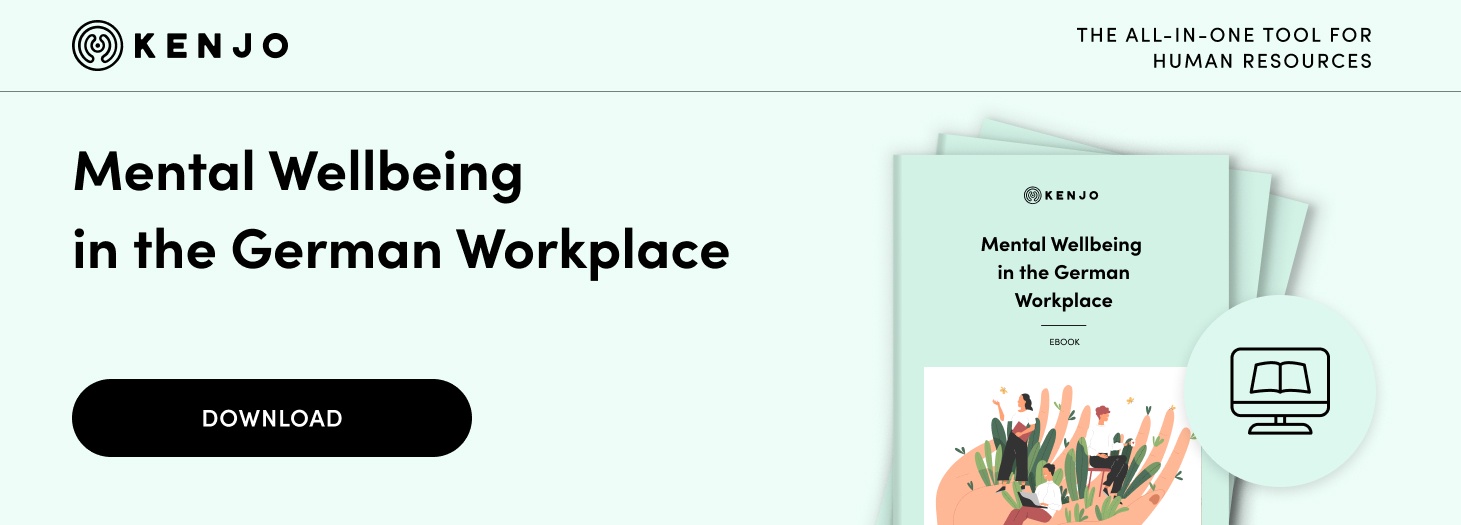Mental health in the workplace is a topic that more and more companies are thinking about. And rightly so. According to the WHO, more than 300 million people in the world suffer from depression. This, alongside other types of illnesses and conditions, has a direct impact on productivity for businesses.
What do we mean by mental health at work?
The World Health Organisation (WHO) defined health in 1964 as: “a state of complete physical, mental and social well-being and not merely the absence of disease or infirmity.”
So, it’s clear that even at that time the organisation recognised the mental dimension of people’s health. And it goes further still, saying that it is not simply a case of the absence of disease, but also implies wellbeing.
In 2001 it published a definition specifically relating to the term mental health as: “a state of well-being in which an individual realizes his or her own abilities, can cope with the normal stresses of life, can work productively and is able to make a contribution to his or her community”.
Therefore, mental health at work is a state of wellbeing in which an individual feels content and is capable of managing their day-to-day problems.
Why is mental health at work important?
The working environment and the way in which work is managed directly influence employees’ mental health. In fact, mental disorders are the second most common health problem in the workplace. Organisations, therefore, must take an active role in promoting effective measures in the workplace and contribute to their employees’ wellbeing.
Mental health at work is closely related to positive financial results, conflict management, customer satisfaction and achieving organisational efficiency.
A happy employee will be much more productive and engaged with the company, will commit fewer mistakes, and will offer better customer service. Generally, it increases the organisation’s competitiveness.
What’s more, according to the WHO, every pound invested in health in the workplace generates 4 pounds in terms of health and productivity in return.
How does mental health affect work?
In contrast, if employee mental health is not actively dealt with, the associated problems can affect not just employees, but the organisation itself: absences, sick days, low productivity, etc.
According to the Health and Safety Executive (HSE) in the UK, in 2019/20 work-related stress, depression or anxiety accounted for 51% of all work-related ill health and 55% of all days lost due to work-related ill-health. On average, each person suffering took 21.6 days for stress, depression or anxiety.
All this has an economic impact on businesses. According to a report by Deloitte, poor mental health costs UK employers up to £45 billion each year. This is a rise of 16% since 2016, an extra £6 billion a year.
The main causes of mental ill health in companies
People’s mental health is subject to many types of external factors; however, in relation to work in particular, there are a number of regular risks:
- Unfulfilled financial expectations.
- Lack of motivation.
- Absence of incentives.
- Inadequate safety policies.
- Inefficient management or communication practices.
- Little decision-making power for employees.
- Conflicts between employees and business owners.
- Low level of support for employees.
- Job insecurity or instability.
- Difficulty balancing home and work life.
- Strict working hours.
- Lack of clear goals.
- Fast-paced work.
- Excessive work load.
- Psychological harassment or intimidation.
- Exposure to constant physical risks.
What impact has Covid-19 had on employee mental health?
Coronavirus has had a huge impact on the working environment. Some factors that have unleashed problems relating to mental health include instability and uncertainty generated by the pandemic, the remote working situation, changes in dynamics and processes, among others.

To analyse how this situation has affected the workplace, we put together a report entitled Mental health in the workplace (Germany 2021), which presents the findings of a survey with more than 2,100 German employees. Some of the most significant data include the following:
- Increase in stress: 40% of German workers reported higher stress levels at work since the outbreak of the pandemic. 38% said the working environment, such as not having suitable infrastructure or circumstances for remote working, and uncertainty about the return to the office, as the main cause of this negative impact.
- Allocated budget: Just 25% of the companies consulted had a budget allocated for wellbeing activities before Covid-19. 31% set aside a budget for this purpose at the start of the pandemic and currently, 56% of organisations have a budget for taking care of their staff’s mental health.
How can HR managers help their employees?
As we have seen, employee mental health is a delicate subject that requires our attention. Companies can support the wellbeing of their staff with some of the following measures:
- Periodical staff satisfaction surveys: the involves sending out questionnaires to the whole workforce every so often to assess how the employees are feeling, what their worries are, what can be done to improve their wellbeing, etc.
- Kenjo software has a specific staff satisfaction survey function, so the talent management team just need to schedule the dispatch and await the results. Thanks to this function it is possible to compare satisfaction rates with the market average and confidently gauge employees’ mental health.
- Clear, precise communication: creating two-way communication channels for feedback and evaluation supports employee wellbeing, as does setting clear goals. Employees feel more valued and understand what the company expects of them, which increases their motivation, and in turn their self-esteem.
- Kenjo lets you work with OKR’s (Objectives and Key Results) with each member of the organisation. In this way, every employee will know what targets they need to reach, and which metrics will be used to evaluate them. It is a very efficient, and increasingly popular method.
- Employee monitoring: companies should monitor an employee’s progression through the company, both to identify potential problems such as continuous absences or frequent sick days, and to support their growth and development.
- Kenjo’s reports and analytics allow you to track employee results alongside company results. The templates are fully customisable, so you can create specific reports for every requirement.
If you would like to know more about employee mental health, don’t miss our report Mental health in the workplace (Germany 2021).


